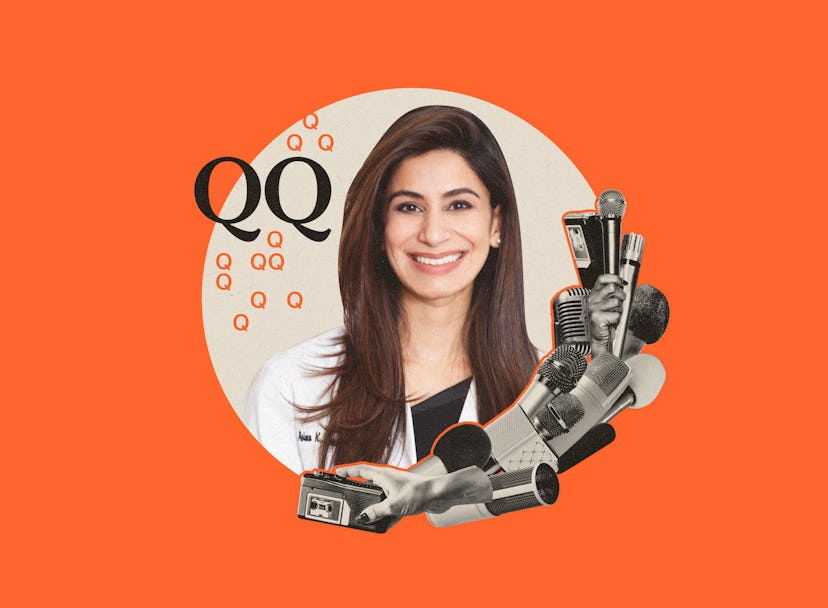Quick Question
A Chance Encounter Led This Doctor To Help Millions Of People Build Families
Plus, a shoutout to the teacher who wanted her to fail.

In Quick Question, Bustle asks women leaders all about advice, from the best guidance they’ve gotten to how they deal with demanding hours. This week, Dr. Asima Ahmad, co-founder of Carrot Fertility, talks about her career path, how she manages stress, and co-founding an app.
Dr. Asima Ahmad, the co-founder of Carrot Fertility, believes in the power of being in the right place at the right time. While attending a 2015 reproductive medicine conference as a physician, she met Tammy Sun, a globally recognized healthcare leader, who was also there as a patient.
The two chatted about accessibility to family planning and fertility treatments, and just like that, the idea for Carrot Fertility was born. Since launching in 2016, the app has provided reproductive benefits for millions, making it the leading family-building and fertility platform.
Carrot is a go-to for companies who want to provide care to employees at all stages of their fertility journeys, including egg freezing, IVF, pregnancy and postpartum care, adoption, menopause support, and more.
“I believe in hard work, commitment, and dedication, but I also believe in fate,” Ahmad tells Bustle. “I think everything happens for a reason... and I just happened to be at that convention with Tammy on the same day.”
Today, the co-founders continue to provide care and information for members to improve their health before, during, and after pregnancy. And they also say they’re just getting started with what Carrot can offer.
Ahmad is a frequent guest on panels, too, like the Women’s Health in the Workplace Panel Discussion moderated by Bustle Editorial Director Christina Amoroso in May in New York, which focused on the diversity of health- and wellness-related challenges women face in their professional lives.
Below, Ahmad talks about life before Carrot, the “rose and thorn” tradition she shares with her kids, and how she handles her busy schedule.
What does your day-to-day life look like as chief medical officer of Carrot?
I’ll go into the clinic for consultations, and I’ll do procedures and surgeries a couple of days a week. On other days, I’m focused more on the [business] side. Carrot is my baby.
How do you maintain your well-being with such a busy schedule?
I’m a mother of four kids under the age of 12, so I follow the “early to bed, early to rise” routine. I go to bed when I put my kids to bed, so I can wake up at 5 a.m. and get my workout in for the day.
I’ll do a combination of Pilates, a run, or bodyweight exercises. I also like The Sculpt Society app. It’s helped strengthen my body and it works well for my body type with [polycystic ovary syndrome (PCOS)].
How do you handle your nerves before a big meeting or presentation?
What’s funny is the second I’m there — whether it’s on stage or TV — it’s so easy. At that point, I’m so relaxed. When I’m sitting there and having a conversation, I feel very comfortable, like I’m having a chat with a friend.
How do you de-stress after a long week?
At the end of the day, I’ll ask my kids about their “rose and thorn.” They share the best thing about their day or “the rose,” the worst thing or “the thorn,” and then their “bud,” aka what they’re looking forward to.
I’ll also have a “golden milk.” It’s milk with turmeric, and it helps me relax. There are also health benefits from it, like anti-inflammatory antioxidants. And then I’ll have a little square of dark chocolate as the cherry on top.
Have you had any mentors who gave you good advice?
When I was in high school, I had an English teacher, Miss D. I remember one day she came up to me and said “I want you to fall flat on your face, and then I want you to get up.” I thought, “Why would my teacher say this to me?”
It was because I had always done so well in school, but she could see that my strategies wouldn’t always work for me. Later, I realized in medical school that I had ADHD, and I had to be more fluid with my approach. If I failed, I had to get back up again and figure out a new way to accomplish a task.
What advice would you give your younger self?
If you truly believe in something, you’ll be successful in it. You might hit some bumps along the way and there may be some hurdles, but at the end of the day, if you’re doing something to help people and it’s for the greater good, you will be successful.
This interview has been edited and condensed for clarity.